Pussy Riot's Masha Alyokhina is working with Belarus Free Theatre to make UK audiences stand up for political prisoners – Jessie Thompson meets them to find out more.
Jessie Thompson, Evening Standard
Belarus Free Theatre exist, but their country will try to tell you that they don’t.
When Nikolai Khalezin and Natalia Kaliada set up the company in 2005 to create boundary-pushing art that challenged President Alexander Lukashenka’s oppressive regime, the state responded by declaring them illegal. The UK became their base, and they became a campaigning force for human rights – a beautiful, urgent, unique presence in theatre.
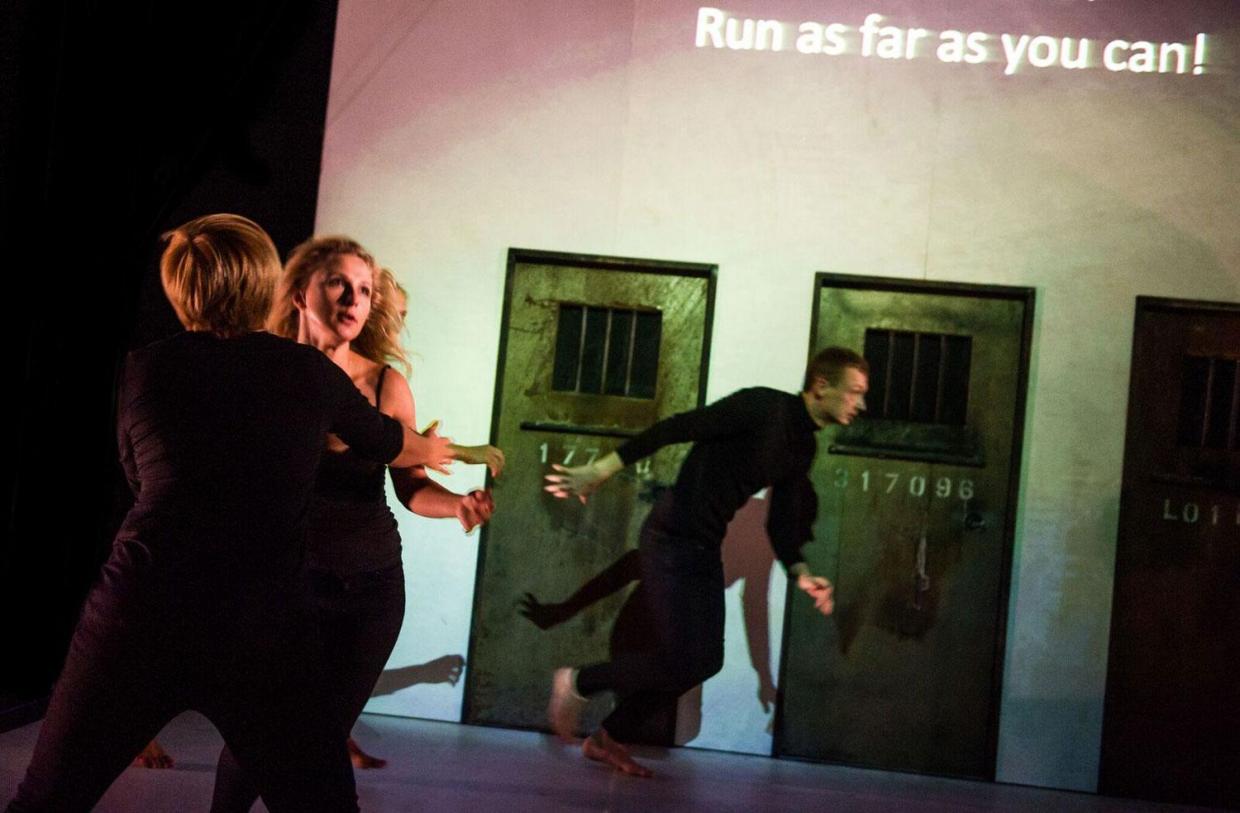
Fearless: Belarus Free Theatre have been declared illegal in their country and now operate from the UK / Alex Brenner
They continue to make art, and the fight still continues; in their latest show, Burning Doors, the art is the fight. Pushing the bodies of their performers to the limit, the show offers the stories of three artists who were criminalised for their beliefs: Petr Pavlensky, whose burning of the doors of the KGB gave the show its name, Oleg Sentsov, a director given 20 years in prison for fabricated charges of terrorism, and Masha Alyokhina, jailed for her activities in Pussy Riot, who adds a raw poignancy to the show by performing in it herself.
Their show is challenging, brutal to the bodies of its performers, and a workout for the mind too, featuring readings from Dostoevsky as well as testimonies from Sentsov about torture he has experienced in prison. On the day I met Belarus Free Theatre, Sentsov’s sister came to Soho Theatre to launch a campaign to free her brother. She urged the audience to think: “the earth is small and Russia isn’t so far. If people don’t start thinking this isn’t allowed in any country, it could start happening anywhere in the world.”
Khalezin and Kaliada may have been brought together with Pussy Riot’s Alyokhina because of their shared experiences of brutality and oppression, but the moment that they found they could work together was one of beauty. They initially met through a visit organised by Amnesty International on Pussy Riot’s release from jail, and later at Belarus Free Theatre’s Staging A Revolution: I’m With the Banned concert, where Dave Gilmour performed alongside Pussy Riot to celebrate the company’s tenth anniversary. But “you need to understand and feel people,” says Kaliada – which was what happened when they travelled to the Calais Jungle together to work with the Good Chance theatre company.
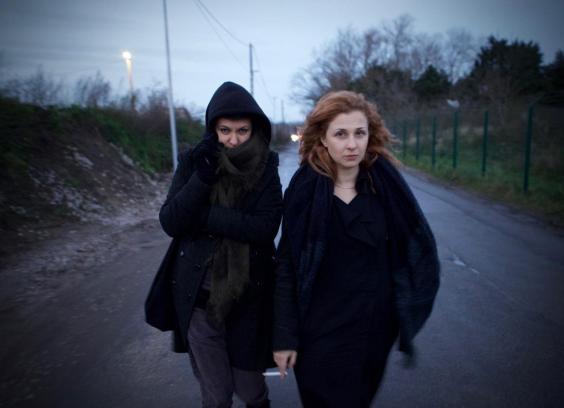
Natalia Kaliada and Masha Alyokhina in the Calais Jungle (Georgie Weedon)
Kaliada tells me that they asked children to draw their dreams on silhouettes on paper. One child wanted a guitar. He went to Kaliada asking for a guitar, but of course she didn’t have one. He went to Khalezin and Alyokhina and asked for one – of course, they didn’t have one.
“And it was drilling a hole in my head: ‘we need to get a guitar!’ And then, while we were entertaining the children, both of them spent three hours going around the suburbs of Calais because it was not possible to find a shop with a guitar. Finally, we had to get our train back to London, Masha had to get an airplane. They got a cab; they had a guitar for the child,” she says.
Kaliada said to him, “at least one dream can come true, you have your guitar. And then he looks at all of us adults, and says, you know, I don’t want a guitar any longer, I want a violin. Do you have a violin?” She laughs at the memory, but even if the gift’s recipient wasn’t satisfied, Kaliada and Khalezin were. “It was that particular moment when you understand that if this particular person is able to spend hours looking for a guitar for a boy then we are ready to work together. Sometimes words don’t mean anything with no actions. They don’t have power. When there are actions, there is a power.”
Working together is a different experience for all of them. The company of actors have been together for a long time, and Kaliada and Khalezin know them very well. “And suddenly we have Masha, who is not too used to these very restrictive methods. This is theatre: we have props, a set, schedules. And for her it’s: ‘yes crazy, yes difficult, yes I don’t like it, but I will do it, because this is the principle of my life.’”
The seed of the show goes further back, from when Russia invaded Ukraine. One of the first people to be killed in the Freedom Square Maidan protests was Belarusian – somebody the company knew from protests – and for people like him, they had “that absolutely unbelievable desire to defend freedom.”
Alyokhina tells me that the show offers a personal challenge to each of the performers – “it’s a question of the limits, both psychological and physical, that you can take to yourself.”
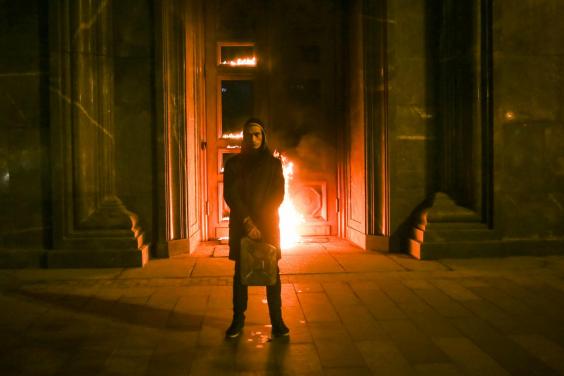
Artist Petr Pavlensky inspired the show's title
For Khalezin, this isn’t something that they can compromise on. “In contemporary theatre, if you don’t run in front of the train, then you’re nowhere.”
For him, the company must search for innovation constantly, and they use their bodies to do this. “We are searching for the limit of an actor’s ability,” he says, “to where actors can no longer exist. He or she loses their strength to the point where they can no longer perform. When we understood where this boundary is, actors have tried to overcome this limit, and then the limit went further again.”
This daunting gauntlet was something that Alyokhina was ready to run with when she started working with the company. “One of the goals for me personally was to take the moments of my life and story which I am most afraid to look at, and to remember and to live them again and again, ten times, twenty, sixty, and say, how far can I go?” she says.
It’s a fearless performance where Alyokhina offers so much – at one point having her head repeatedly held under water as she recites lines of poetry. It’s hard to see someone go through this trying physical violation, but for her, it is one of the most significant moments in the performance.
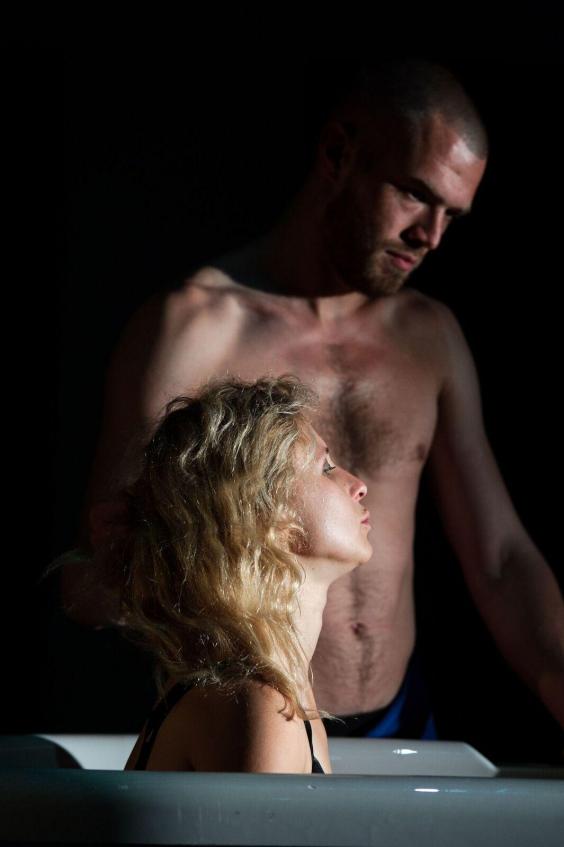
Masha Alyokhina stars in Burning Doors (Alex Brenner)
We’re offered scenes of prison life, and a life afterwards in which she is in constant demand, always being asked the same questions. But it is this scene in the bath that “is actually my reflection on the hardest moment for me in this story.”
“Because you can show prison and people will understand. You can show publicity and media pressure and people will understand. But how to show the moment when you are looking into the mirror and don’t know what to do with it? Because it’s how I understood that I’m free. So that scene is about feeling freedom.”
Something that emerges from the show is a sense of gendered prejudice in how female activists are treated. At one moment in the show, Alyokhina’s body is lifted high into the air amid shouts for her to admit her Pussy Riot protests were done for self-promotion. And yet when artist Petr Pavlensky nailed his scrotum to the floor of the Kremlin, no one heckled him to say he was doing it because he wanted attention.
Alyokhina agrees that being a woman and being political is often seen as unacceptable. “Especially here, we’re talking about Russia. We don’t even have a First Lady. We totally, completely, 100% don’t have female figures in politics. So we don’t have women as role models, in politics, as activists – nobody. Because Putin wants to show that you can only be macho.”
“I think they are afraid of sexuality,” she continues. “They don’t know what to do with it.”
Most will remember that Pussy Riot were arrested and eventually jailed for singing a song about Putin in a Moscow church – for only 40 seconds in fact. Alyokhina says that, “I really think that the story would be different if in the church it was boys.”
She recalls a famous interview Putin gave during Pussy Riot’s trial. “He said, ‘do you know how the name of their group translates into Russian? It’s immoral to say this.’ But I mean, it’s probably not moral to put their troops into another country. To make an annexation of territories of other countries; this is probably immoral.”
The barbarity inflicted on Alyokhina, Pavlensky and Sentsov by their country’s regimes is presented to us in Burning Doors in a way that allows us to bear witness to their experiences – but this is not the most important aspect of the show, Khalezin tells me.
“The fact that information is true doesn’t mean there’s any point in it being spoken on stage,” he says. “The discussion first of all has to be artistic. That’s why bearing witness makes no sense if it’s not supported by vivid artistic imagery. The world is overloaded by boring documentary performances anyway.”
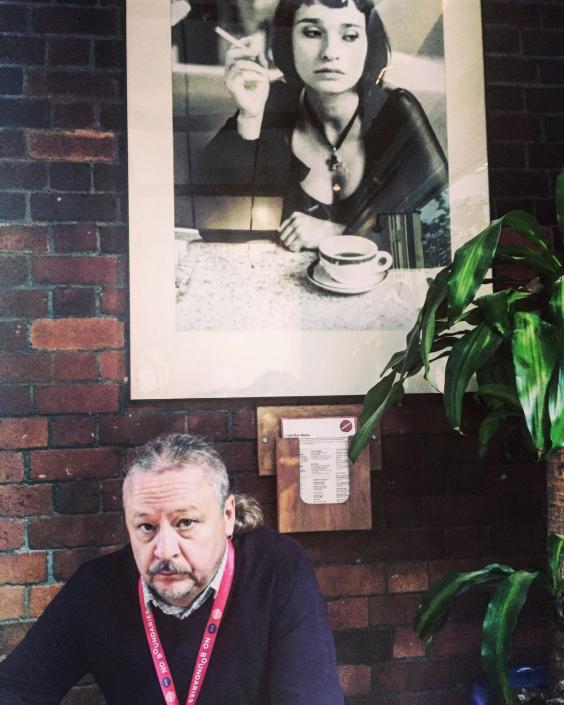
Co-founder and director of Belarus Free Theatre, Nikolai Khalezin
In fact, Khalezin does not believe in the term ‘political theatre’. It was started by Brecht and ended with Brecht, he says. “Theatre does not declare any ideas, it can only outline some questions and zones of interest,” he says.
“The question is, what does the audience leave the performance with? A man comes and watches the show, he goes home, and reaches out to get a Dostoevsky book, or goes to Google to search Oleg Sentsov – then there was a point in the show. If he comes out of the theatre and forgets about it then there’s no meaning for the theatre, or its existence at all.”
Kaliada tells me about a lesson they learned from playwright Tom Stoppard, who is one of Belarus Free Theatre’s patrons. “He gave a very specific lesson, not even realising he was giving one,” she says.
“He said that an artist needs to create high quality art, and when you do it, then politicians will listen to you. Because it’s not propaganda. It’s nothing about that – it’s about you. Do your art, and when you’ve finished, you talk to them. It gives you that particular right,” she says.
There’s an eerie sense of a fear of the future in Belarus’s unwillingness to acknowledge the company. Go to the country’s website and you’ll find a page celebrating their culture: “today the country boasts a diverse range of theatre and drama,” it reads. But a journalist asked the Ministry of Culture why they threatened to take the license of a cafe that hosted a performance by BFT, and “the answer was very simple: ‘they don’t exist’.”
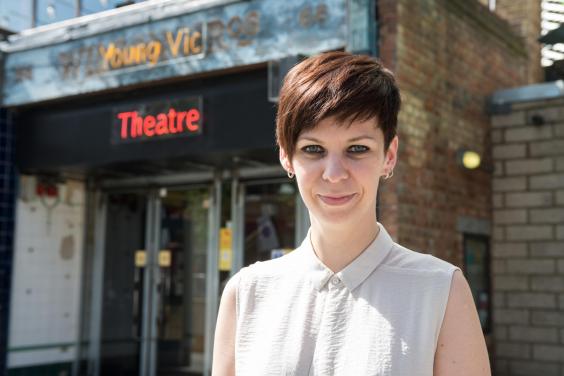
Co-founder and director of Belarus Free Theatre, Natalia Kaliada
It is only Ukrainians who are unafraid to look forward, Khalezin says – Russians and Belarusians both fear it. And why shouldn’t they? A man in Russia was recently given five years in prison for playing Pokemon Go in a church. “And this doesn’t surprise anyone,” he adds.
It sounds naive to ask, but I wonder if Kaliada and Khalezin could have believed that the political situation would remain so barbaric when they set BFT up in 2005. “No,” is Kaliada’s quick answer.
“My grandfather was in a Stalinist jail. When Nikolai was arrested, we came to my grandma after he was released, and she said ‘I can’t believe that it would happen to my grandchildren’. It’s a part of the world where you have dictators all the time. Of course we couldn’t predict that our friends would be killed” – six years ago, their friend and journalist Aleh Biabenin died under suspicious circumstances, and when they began rehearsals they found another friend had been killed by a car bomb – “but you know it will happen, just not when or how. It kind of becomes a normality of your life – a scary one.”
Over ten years later, there is no sign that they will be able to operate in their own country, but having made the UK their base, the Brexit vote has left them concerned.
“My friend said about Britain at that moment: it’s weird to become a person who shot himself in the leg, and then decided to cure himself, and then shot himself in the other leg,” Khalezin says. “For me, Brexit is a personal assault.”
Kaliada agrees, talking about being at the Young Vic theatre (where they are an associate company) when they received the news. Their restaurant, The Cut, has a number of European staff, she says, and “people were just in tears. All the team members who were British were apologising for their country.”
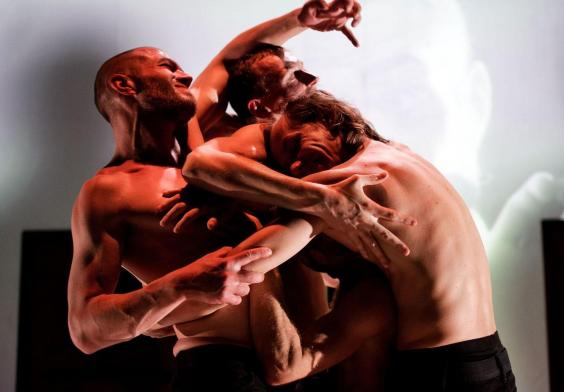
Burning Doors pushes its performers to their limits (Alex Brenner)
She laments that emotional short term decisions are made without an understanding of the long term consequences, citing Oxford Professor Theodore Zeldin’s suggestion that mankind makes its greatest mistakes because we don’t learn about global history.
“How deep can a country bury itself?” asks Khalezin. “I feel great pity, as I came from a country that did bury itself. It’s buried there for 22 years. And here I saw the same moods as at some points in Belarus.”
There is a fear that people in the UK are no longer thinking about political prisoners in Eastern Europe, and Belarus Free Theatre hope to remind people with Burning Doors. If there is a possibility that they can help to release even one prisoner, they will fight.
“We understand we are simple artists – we are not politicians or journalists. But what we want to do is talk to British people and say: guys, we love you. It’s our second home land. We are refugees here. But you have a luxury as a democracy; we don’t have it back there. Use that tool. Write to your MPs. Parliament has to put pressure on the Russian government to release those people. If you have that strong tool, use it. People there, they don’t, and they are dying and being tortured for that.”
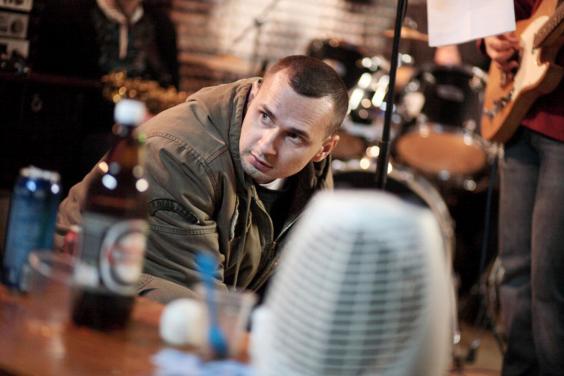
Belarus Free Theatre are campaigning for director Oleg Sentsov's release from prison
In the face of such brutality, many would have given up, but Alyokhina is adamant that she will continue being an activist. “I have no right to say this, because people believe in me. And it’s just not possible to say that I can’t.”
“What are you afraid of? What can they do?” she asks. “They can put you in prison. That’s it. It’s just what’s around you. Okay, they can kill you, but that will be the end of your story. In the show, you hear Petr Pavlensky’s text, it’s a reflection on fear. He said, artists are afraid like everybody. I was afraid yesterday. And I realised, it’s just an instant. It came to nothing.”
The fearlessness of the heart matches the fearlessness of their art, and the company will be holding an event on October 10 in the House of Commons to urge politicians both to listen and to open their eyes. It’s something they’ve done before, accompanied by Jude Law, Tom Stoppard and Kevin Spacey.
“The guards asked us, who are you? We said, we are theatremakers. They said, why are there so many of you? We said, we plan to perform now. They said, theatremakers? In Parliament? Never before. And we said, we will be the first,” Kaliada smiles. “And that is the whole point. We will be the first. We will talk to you here. We will not keep silent here. And hopefully that voice will be heard.”
Subscribe to our mailing list: